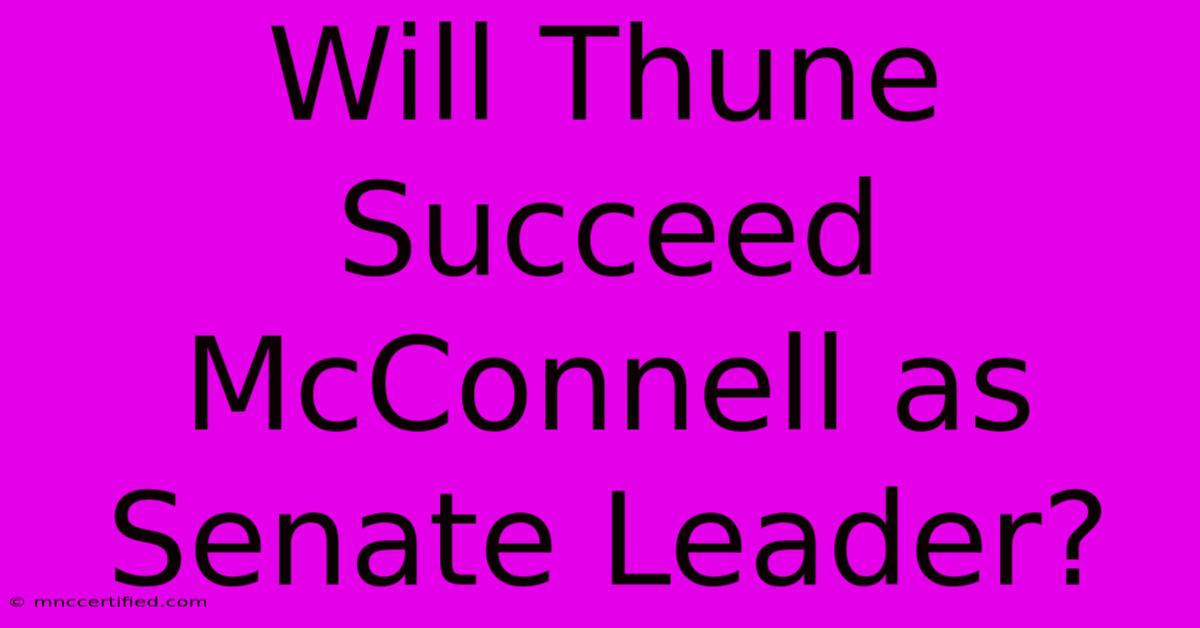Will Thune Succeed McConnell As Senate Leader?

Table of Contents
Will Thune Succeed McConnell as Senate Leader? A Look at the Potential Power Shift
The recent announcement of Mitch McConnell's retirement from Senate leadership has sparked intense speculation about his successor. While McConnell's departure marks the end of an era, it also opens the door for a new generation of Republican leadership to emerge. One name that has frequently surfaced as a potential contender is Senator John Thune of South Dakota. But is Thune the right fit to lead the Republican caucus in the Senate?
Thune's Credentials: Experience, Relationships, and Ideological Alignment
Thune, a seasoned politician with over two decades of experience in the Senate, brings a wealth of knowledge and understanding to the table. His long-standing relationships with both Republican and Democratic senators could be crucial in navigating a potentially divided chamber. Furthermore, Thune's conservative credentials align with the majority of the Republican caucus, making him a palatable choice for many.
His strengths include:
- A Strong Fundraising Network: Thune is known for his strong fundraising abilities, a valuable asset for any political leader seeking to maintain control of the Senate.
- Experience in Key Committees: His work on committees like Banking, Housing, and Urban Affairs and Commerce, Science, and Transportation has given him valuable insight into critical policy areas.
- A Pragmatic Approach: Thune is known for his ability to compromise and build consensus, which could be crucial in a Senate where bipartisanship is increasingly difficult.
Challenges and Considerations: The Road to Leadership is Paved with Obstacles
However, Thune's path to leadership is not without its hurdles.
His potential challenges include:
- A Potential Primary Challenge: There's always a possibility that a more ideologically conservative candidate could emerge and challenge Thune in a primary election, potentially hindering his chances.
- Facing a Divided Republican Caucus: The Republican party is increasingly divided, with ideological clashes between moderates and conservatives. Thune may struggle to unite such a diverse group under his leadership.
- The Potential for a Democratic Majority: While the Republicans currently control the Senate, there's a real possibility of Democrats gaining the majority in the upcoming election. This would make it significantly harder for Thune to wield power.
Other Potential Candidates: A Competitive Landscape
Thune is not the only Republican senator vying for the leadership position. Others like Senator Tim Scott of South Carolina, Senator Rick Scott of Florida, and even Senator Ted Cruz of Texas are also considered potential contenders. Each of these senators possesses a unique set of qualifications and experience, further complicating the race for the leadership position.
Looking Ahead: A Time of Transition and Uncertainty
The Republican caucus is facing a crucial transition period. As McConnell steps down, the party will need to select a leader who can unite the caucus, navigate political challenges, and effectively represent their interests. While Thune is a strong contender, his path to leadership is not guaranteed. The coming months will be crucial in determining who ultimately takes the reins of the Republican party in the Senate and guides them through the next chapter of their political journey.
This analysis underscores the complexities and uncertainties surrounding the potential leadership change in the Senate. It remains to be seen who will ultimately emerge as McConnell's successor, and whether they will be able to effectively navigate the political landscape and maintain the Republican party's power in the chamber.

Thank you for visiting our website wich cover about Will Thune Succeed McConnell As Senate Leader?. We hope the information provided has been useful to you. Feel free to contact us if you have any questions or need further assistance. See you next time and dont miss to bookmark.
Featured Posts
-
How Long To Keep Insurance Policies
Nov 14, 2024
-
Sri Lanka Wins Highlights Vs New Zealand
Nov 14, 2024
-
Netflixs Oscar Entry A Captivating Film
Nov 14, 2024
-
Tyson Vs Paul Numbers Tell The Story
Nov 14, 2024
-
York Alum Takes Home 2024 Booker Prize
Nov 14, 2024